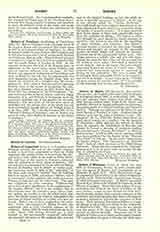

Robert of Melun (DE MELDUNO; MELIDENSIS; MELIDUNUS), an English philosopher and theologian, b. in England about 1100; d. at Hereford, 1167. He gets his surname from Melun, near Paris, where, after having studied under Hugh of St. Victor and probably Abelard, he taught philosophy and theology. Among his pupils were John of Salisbury and Thomas A. Becket. Through the influence of the latter he was made Bishop of Hereford in 1163. Judging from the tributes paid him by John of Salisbury in the “Metalogicus” (P.L., CXCIX), Robert must have enjoyed great renown as a teacher. On the question of Universals, which agitated the schools in those days, he opposed the nominalism of Roscelin and seemed to favor a doctrine of moderate realism. His principal work, “Summa Theologise” or “Summa Sententiarum” is still in MS., except portions which have been published by Du Boulay in his “Historia Univ. Paris“, ii, 585 sqq. He also wrote “Quaestiones de Divina Pagina” and “Quaestiones de Epistolis Pauli”, both of which are kept in the Bibliotheque Nationale. Those who have examined the “Summa” pronounce it to be of great value in tracing the history of scholastic doctrines.
WILLIAM TURNER

